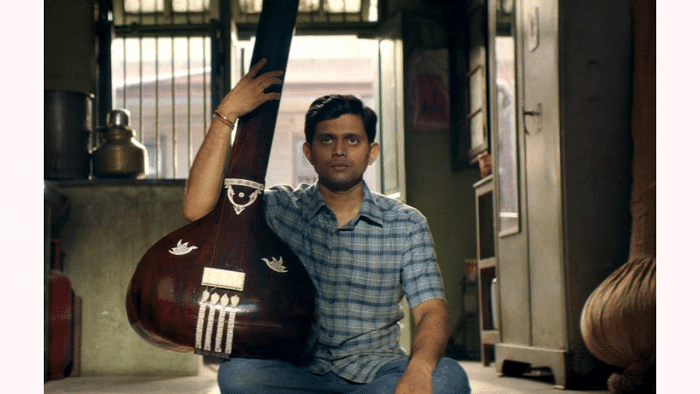
In these really trying times ruled by the Covid-19 virus, two unusual Indian films, Sir directed by Rohena Gera and The Disciple by Chaitanya Tamhane, give food for thought. They are international co-productions written and directed by independent filmmakers from Mumbai.
The first, Sir, made by the Stanford University-educated Gera, is a rigorous, intelligent, deeply felt story about a jilted young architect Ashwin who returns from the US to his plush flat in Mumbai and gradually falls in love with his caring maidservant Ratna.
The second film, The Disciple, is also about a cultural problem. In it, Sharad Nerulkar, an aspiring vocalist of Hindustani classical music, is caught in these fast-changing times, when this particular form of music is on the verge of a troubling, even painful transformation. People simply do not have the time to listen to music, whether vocal or instrumental, which is essentially contemplative.
Tamhane made his name with his first Indie feature, Court, a witty, highly critical examination of the Indian judiciary and hence the system. In the film, a Dalit folk theatre activist is repeatedly sent to jail for writing a song about a poor Dalit Mumbai sewage worker who died inhaling poisonous gases at work not having been provided with the right protective gear by the government.
His second film, under the guardianship of Alfonso Cuaron, the internationally famous Mexican filmmaker, who happens to be the executive producer on The Disciple, finds Tamhane on slippery ground. The film has been lionised abroad where knowledge of Hindustani music and the crisis it finds itself in now is minimal
In terms of form, The Disciple is as interesting as Court. The disciplined, even austere structuring confirms the maturity of technique evident in Tamhane's first film and shows his grasp of cinematic storytelling.
Where he slips up badly - a minority opinion – is the inadequate grasp of his subject matter, though he makes some pertinent observations in the voiceover about a near-mythical character called 'Maii' or Mother, a deceased great singer, who believed that Hindustani music was about seeking; not just acquiring musical knowledge but through it an understanding of the wisdom and beauty of life and living. It was about Marga Darshan.
The vocal music that Sharad is learning from his guru is pretty pedestrian, as is the battle-scarred veteran's singing, though the old man keeps talking about riyaz, or practice, and of learning for its own sake. The words do not ring true because Tamhane has not heard enough of truly memorable Hindustani music to come up with apt musical examples to bolster the teacher's words.
The one unforgivable error he commits is suggesting in a voiceover of Maii's that the Muslims polluted Margiya Sangeet. The opposite is true. It is the Muslim contribution to our heritage of Margiya Sangeet over many centuries that has greatly enriched it, and Hindustani music became a glorious example of our syncretic culture.
Sir deals with day-to-day living and how a class-ridden society in the India of our times circumscribes our best intentions and prevents positive action. Without either being a Marxist or even Marxian, Gera remains in her storytelling approach a humanist, aware of the deepest desires and aspirations of individuals and the conditioning of their class moorings.
Ashwin, the son of a westernised big-time builder, returns to Mumbai emotionally shattered after his fiancée suddenly calls off their wedding. He summons his erstwhile maid Ratna to take charge of his apartment once again. He tries gamely to cope with his trauma but with limited success.
Ratna senses his pain and helps him greatly by being constantly attentive towards him by doing her work with consistent efficiency and care. Gradually they come to respect each other as individuals and slowly fall in love, and he is unwilling to accept their employer-employee status. She is all too aware of her role as his servant, although she has a not-so-secret desire to learn to tailor (for which she has a talent) and then become a fashion designer.
Gera's style is cool, detached yet committed to preserving the dignity of her two protagonists who represent the two extremes in the social scale, that of high privilege, meaning easy access to power and money, and its opposite, where the necessity of earning one's daily bread and preserving one's dignity becomes an ongoing struggle.
Gera gives her film an open ending. She evokes a strong sense of empathy in the viewer for her two characters by her deeply felt cinematic treatment; therein lies her triumph.
Both films were made with international funding, thereby allowing each director to work with complete artistic freedom.
Tamhane's The Disciple and Gera's Sir could be made exactly the way they were intended because box office considerations did not hamper them. They had the scope to earn back their investment and earn a reasonable profit on the international market. More such films of serious intent ought to be made in the near future.
(The writer is a film critic)
Disclaimer: The views expressed above are the author's own. They do not necessarily reflect the views of DH.